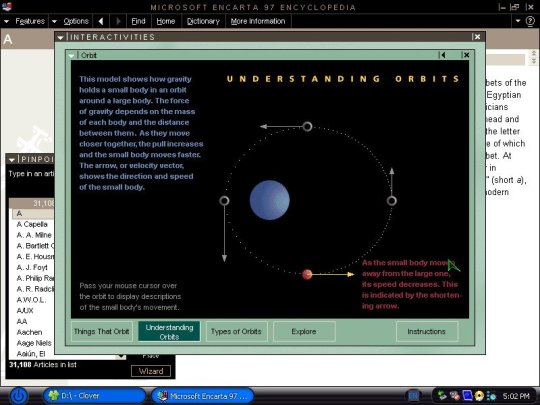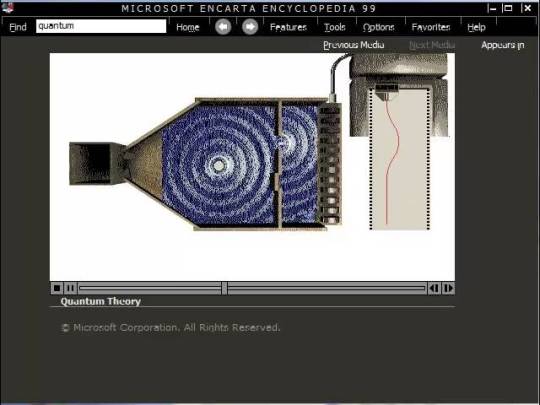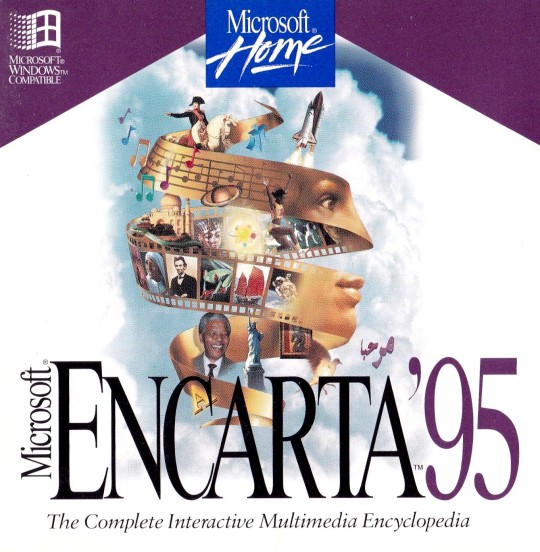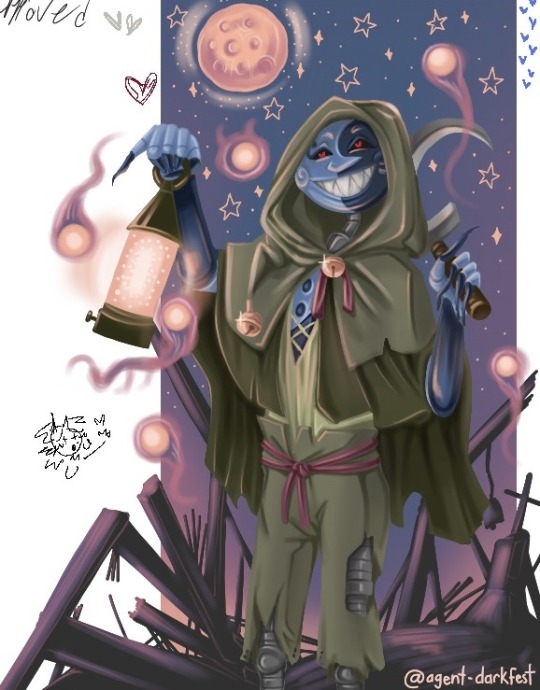#Microsoft Encarta
Explore tagged Tumblr posts
Text








This game was found on the Microsoft Encarta disc, for being an educational game it was so much fun. I miss playing it, and was so mad when my dad - Mr. "I keep everything" - gave away his Encarta disc.
4 notes
·
View notes
Text

this is in the files of microsoft encarta 2000
MMMMMMMMMMMMM
(yes i know my first name is in the file path. it’s fine. look at my cool name idc)
#um i know theres a name for looking through files but i forgot it#encarta#microsoft encarta#microsoft
1 note
·
View note
Note
When you played with Encarta 98, how much time did you spend on the orbital mechanics minigame? (And was it at all relevant for your later Kerbal excursions?)
I actually had to look this up, it seems familiar, but I don't really have specific memories of it

When I first started playing kerbal, my first rockets just few straight up. I 100% knew this was wrong, but it took a bit to make something that could fly a sensible trajectory without collapsing.
I don't really remember too many specific parts of Encarta TBh. I think it all got lumped into general knowledge.
My clearest memories of Encarta was the double split experiment thing, though:

Somehow that was what stuck with 6-8 year old me
#I think there was some stuff about atoms and maybe electricity but yeah i was pretty young when i had this#My high school physics class did do ballistic motion but there's a bit of a jump between looking at newton's canonball and understanding#how shaping orbits using thrust works. The XKCD comic about understanding orbital physics is very true#encarta#microsoft encarta#kerbal space program#oh hey this finally posted. i hit queue by mistake and it got lost in the void forever
0 notes
Text

513 notes
·
View notes
Text

349 notes
·
View notes
Photo
Okay, so I had to go down a little nostalgia trip. Microsoft in the 90s was pretty much killing it, as far as this kiddo was concerned. And 99% of that was simply the encyclopedia programs they developed. Dinosaurs was banger (1993), but my favorite game in 1996 was Encarta Mind Maze.
youtube
Then came Encarta World Music:
youtube
I haven't been able to find any video recordings of the game (you can see the button in the above video). I began playing the cello at 8 (1994), and I do really think that playing the game and going through these entries obsessively, helped with my ear training. I was exceptionally good at picking out instruments and phrasing from ensembles from an early age.
With the advent of the Internet, and with more demands on my time from school, extracurricular activities, other interests, etc., as I got older, I just stopped using Encarta entirely. I am a bit sad thinking about how I don't have an up-to-date Mind Maze or Dinosaurs that I could just fire up and explore for hours at a time.









Microsoft Dinosaur Enciclopedia CD-ROM 1993
https://jpnostalgia.tumblr.com/
source
1K notes
·
View notes
Text

I know everyone's popping off about the shiny new show and all the inspirations and the hot twink raggedy andy rabbit, and it certainly is all that and a bag of chips, props to @gooseworx and the Glitch Productions team for the incredible heart and charm of the Pilot episode, but I'd like to talk about one of the influences that seems to have gone largely unaddressed.
For me personally, the first few frames of the pilot and the teaser images I stumbled upon in the typical unhealthy ADHD fixation that followed awakened a long dormant sense of wonder that I have not felt since I was a child, planted in front of the family's Compaq Presario, graced by the ephemeral melody of the Windows 95 launch theme, readying to boot up Pajama Sam in "No Need to Hide When it's Dark Outside" for the first time. Maybe some of you remember too:

So overwhelming was this sensation that, after I watched the credits roll on the pilot, I immediately searched for this game, to see if I could maybe finagle DOSBox into running some beige box abandonware for an afternoon on the weekend. Lo and behold, a heady draught of nostalgia from Humongous Entertainment is readily available on steam for the relatively low price of seven dollars a pop. Cashing in on nostalgia be damned, I couldn't stop myself from traveling back in time to 1996 to enjoy it for the first time in over two decades.
I have to say, with everything that's going on in the world right now, it was a nice little escape. But it made me realize that there's a strange dearth of edutainment titles past the mid-to-late 2000s, or at the very least, they don't seem to stand out amid the mountains of content aimed at children today. Where are the Spy Foxes and Freddi Fishes for today's kids? The Math Blasters and Oregon Trails? Dare I even ask it - Where in the world is this generation's Carmen Sandiego?
I know it would be impossible to maintain the tone of the show in such a work, but good god almighty would I love for there to someday be a real, actual game as implied by those teaser images, either for an all-ages audience or just for us gremlins. Like I have student loans and I would throw downright unreasonable amounts of money at this.
#the amazing digital circus#gooseworx#edutainment#humongous entertainment#carmen sandiego#freddi fish#pajama sam#spy fox#putt putt#microsoft encarta?#IDK it counts I guess#nostalgia train woo woo
8 notes
·
View notes
Text
i finished cunk on earth and it reminded me soooo much not of once upon a time… earth but the feeling i used to have watching it sooo nice
#she also visited this castle that i’m sure i used to visit on microsoft encarta#it has to be the same
0 notes
Text
lamarckism
#just wanted to look something up and suddenly im reading history on britannica. iykyk#do yall remember before the internet and wikis got big they had to write everything down and print books#oh world book still prints editions. thats cool. also just got reminded of microsoft encarta. anyone remember that#before i discovered the internet and neopets id just play the labyrinth game in encarta. what a miserable existence i was
0 notes
Text
@nightmaresyrup recently reminded me that digital encyclopedias used to be a thing. It's possible that some of my early "Internet" memories are really only C.D.-R.O.M. memories.

16 notes
·
View notes
Text



Microsoft Encarta 2009
#2009#2000s#09#00s#art#design#frutiger aero#graphic design#graphics#microsoft#screenshots#techcore#tech#technology#vector#website#windows 7
181 notes
·
View notes
Text
Well… I was really on a roll this past Magma session! I think I may have finally found the brush combinations that I enjoy sketching/doodling with! :)


Also, I tried my hand at drawing Fool from @venomous-qwille story GITM for the first time ever! I thought I was gonna have a hard time, but his design was so fun to draw out!
It also helped that I had the theme music from Microsoft Encarta’s "Mindmaze" playing the whole time. It’s really silly, but it put me in the zone: Mindmaze

177 notes
·
View notes
Note
Just passing by to ask
Do you know the Microsoft encarta stuff ? Because you really exude that vibe. Like the sciencey feature stuff, especially.
No I was an Eyewitness documentary kid
19 notes
·
View notes
Note
What makes an artwork highbrow? What makes another low?
Keeping in mind that this is a sociological rather than an aesthetic distinction, I believe the distinction hinges on how much you already have to know about art in general to appreciate any given work. As the sociologist Pierre Bourdieu writes:
A genre containing ever more references to the history of that genre calls for a second-degree reading, reserved for the initiate, who can only grasp the work’s nuances and subtleties by relating it back to previous works. By introducing subtle breaks and fine variations, with regard to assumed expectations, the play of internal allusions (the same one that has always been practised by lettered traditions) authorizes detached and distanced perception, quite as much as first-degree adherence, and calls for either erudite analysis or the aesthete’s wink.
This is most obvious in the case of a work that is both intensely allusive and extremely sophisticated in technique, like Ulysses, but it also applies to works of a radical simplicity or even contentlessness, like the writings of Gertrude Stein or the paintings of Jackson Pollock, where you have to know enough about art to know why this apparent non-art ("my toddler could paint that!") is actually very serious and meaningful art.
In practice, these distinctions don't hold. They don't hold aesthetically, because most actual practitioners say that the relevant distinction is not high and low but good and bad. But they also don't hold sociologically. The high-low distinction only applies after the mass literacy of the late 19th century, which generated both a mass culture industry and writers and artists who wanted to set themselves apart from this mass culture industry. The very same industry, however, produces such a proliferation of niche markets that even low-art genres become as complex and recursive in their own traditions as the high-art genres, such that you can't really just hand The Big Sleep or Dune or Watchmen to a person off the street anymore than you could with Ulysses. This is the symbolic import of the factoid I am always insisting upon: that this all comes from Poe, that Poe invents both Mallarmé and Lovecraft.
Then "middlebrow" as a concept presents problems of its own. A serious critic wants to scorn the middlebrow and uphold only the raw energy of the lowbrow and the radical intellection of the highbrow, but this standard is too severe. Anti-middlebrow critics get trapped in a hipper-than-thou spiral, or, to vary my image, they futilely chase an unreachable horizon of authenticity and difficulty. There is such a thing as middlebrow—we know it when we see it—but if you become obsessed with the idea, then soon you'll find that nothing is astringent enough for your taste. Anti-middlebrow critics may start by dismissing Our Town and The Grapes of Wrath, but they will inevitably end up writing "Against Ulysses."
Finally, these categories assume too much about who attends to what, and where and when and for what purpose. I quoted that Bourdieu passage above this summer in my Oppenheimer essay. Is Oppenheimer lowbrow, middlebrow, or highbrow? A film made for and sold to a mass audience through memes and sex appeal (lowbrow), a film full of Big Themes and Human Interest and Major Issues (middlebrow), a film formally ambitious, politically ambiguous, tragic in theme, and freighted with unexplained scientific, historical, political, and cultural allusions (highbrow)? I just don't think it's a very interesting question.
Do these categories explain why I read about Ulysses on Microsoft Encarta when I was 13 years old? (It included a recording of an Irish actress doing some of Molly Bloom's interior monologue.) I first checked the novel out of my suburban public branch library the summer of the same year and determined to read it, a task I admittedly didn't accomplish in full until later, when I was in college, just as Bourdieu would predict. But the ambition first found me in the lower-middle-class suburbs through a simple consumer conveyance rather than through any type of elite training.
I don't mean to sound a note of false populism here, to suggest that there's much hidden greatness in the morass of cranked-out junk clogging Amazon. It is, as I've written, "lonely at the top." My populist instinct, insofar as I have one, runs in the other direction: not "low art is actually great" but rather "great art is actually for everyone." (Or perhaps not "everyone" but "anyone." Not every single person but any single person capable of being found by it, which can't be determined in advance.) Still, the worth of a work of art is not extrinsically determined by the position it occupies in the social field, as the sociologists claim, but rather relies on its intrinsic merit in dynamic interaction with an unpredictable range of actual and potential audience members.
21 notes
·
View notes
Text



Microsoft Encarta 97 MindMaze
2K notes
·
View notes